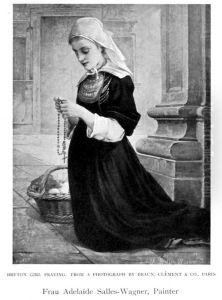Adelaide Salles-Wagner Paintings
Adelaide Salles-Wagner was a French painter born in 1825, whose body of work is often celebrated for its delicate portrayal of both genre scenes and portraits, with a particular emphasis on the depiction of women and children. She was part of the mid-19th-century European art movement, a time when female artists began to gain some recognition, albeit still facing significant barriers to full acceptance in the predominantly male art world. Salles-Wagner's work is characterized by its fine detail, sensitive use of color, and the emotional depth she brought to her subjects, which ranged from the everyday lives of people to more idealized historical and mythological themes.
During her lifetime, Adelaide Salles-Wagner achieved a level of success unusual for female artists of her time. She exhibited her work at the Paris Salon, a prestigious venue for artists to showcase their work in France, and received positive critical acclaim. Her talent was recognized by her contemporaries, and she was awarded medals for her submissions to the Salon, a testament to the quality and appeal of her art. Despite the accolades, like many women artists of her era, Salles-Wagner did not always receive the same level of recognition or remembrance as her male counterparts in the history of art.
Salles-Wagner's contributions to art were significant not only in terms of her personal achievements but also in the way she paved the way for future generations of women artists. By succeeding in the male-dominated art world of the 19th century, she helped to challenge the prevailing norms and opened doors for others. Her paintings, which often explore themes of femininity, beauty, and domestic life, invite viewers to consider the depth and complexity of women's experiences and perspectives.
Adelaide Salles-Wagner passed away in 1890, leaving behind a legacy that has been somewhat overshadowed by the more celebrated figures of her time. However, in recent years, there has been a growing interest in rediscovering and reevaluating the contributions of female artists like Salles-Wagner. Her work is now appreciated not only for its aesthetic qualities but also for its historical importance in highlighting the role of women in art history. As scholarship continues to explore the contributions of women in the arts, the work of Adelaide Salles-Wagner stands as a significant testament to the talent and perseverance of female artists in the face of societal challenges.

![Portrait De Jeune Femme Au Chale De Dentelle [adelaide Salles-wagner ; Lady With A Lace Shawl ; Oil On Canvas Signed]](https://www.niceartgallery.com/imgs/961038/s/adelaide-salleswagner-portrait-de-jeune-femme-au-chale-de-dentelle-adelaide-salleswagner-lady-with-a-lace-shawl-oil-on-canvas-signed-b747f02b.jpg)











